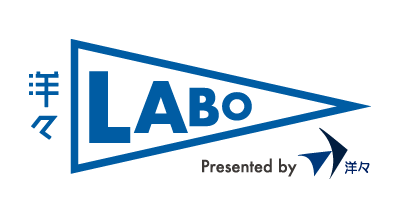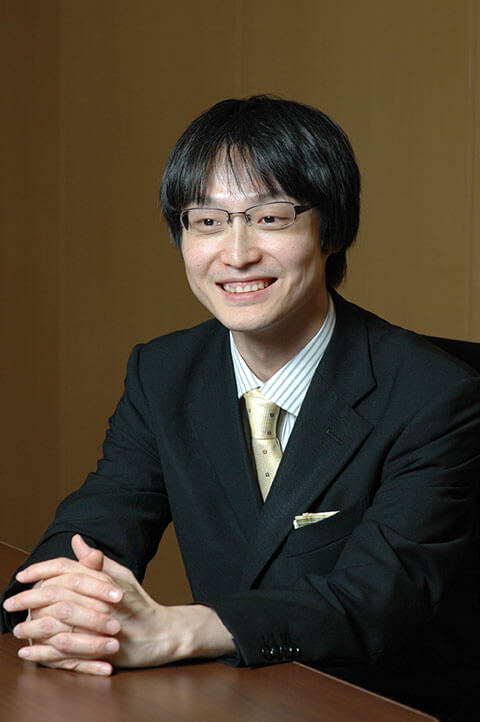
※For the English version of this article, please scroll down the page.
入学試験概要
こちらのページでは、早稲田大学国際教養学部(School of International Liberal Studies, SILS)の4月入学選考(国外AO)および9月入学選考の入試概要と対策の方法について紹介します。
早稲田大学国際教養学部・SILS(School of International Liberal Studies)とは?
早稲田大学の国際教養学部(以下SILS)は2004年に新しく創設された学部で、幅広い学問領域や分野に精通し、かつ英語での高度なコミュニケーション能力を有する人材の育成を目指す、リベラルアーツ型の学部です。
SILSは早稲田大学におけるリベラルアーツ教育のパイオニア的存在であり、学生は様々な分野の学問を横断的に学ぶことができます。またSILSでは1年間の海外留学が卒業要件に指定されており、アメリカやイギリスの大学はもちろん、ヨーロッパやアジアの大学への留学も可能です。
授業の多くが英語で実施されている他、外国からの留学生も多数在籍しており、国際色豊かな環境が備わっているのもSILSの特徴の一つです。
出願の時期・内容について
SILSは4月入学および9月入学とで、個別の入試を設けています。
4月入学日本国内の高校生および既卒生を対象とする「国内AO」と、日本国外で教育を受けた高校生および既卒生を対象とする「国外AO」の2つの入試から成ります。本記事で解説するのは後者ですので、国内AOの情報をお探しの方はコチラをご覧ください)。
9月入学には上述の様な区分は設けられておらず、出願資格を有する全ての受験生が出願可能です。ただし、ほとんどの受験生は国外での教育を受けた高校生および既卒生からなります。
募集人数は4月入学(国外AO)では100名、9月入学では150名です。残りの募集枠は4月入学(国内AO)や一般選抜の合格者に割り当てられます。
4月入学(国外AO)の出願期間は例年8月下旬から9月上旬に設定され、同年11月後半に選考結果が発表されます。面接審査が必要と大学が判断した受験生においては、11月ごろに面接が実施されます。
9月入学の出願期間はEarly AdmissionとRegular Admissionの2つに分けられており、受験生はどちらか一つの期間を選択します(併願不可)。Early Admisssionは例年1月初旬〜中旬に、Regular Admissionは1月中旬〜2月上旬に出願受付が行われます。
Early Admissionに出願した受験生はまずEarly Decisionという選考枠にて審査が行われ、合格した受験生には3月上旬に合格の通知が行われます。
この時点で合格とならなかった(Deferredとなった)受験生はRegular Admissionの受験生と同じ枠で再度審査が行われ、Regular Admissionの受験生、およびEarly AdmissionでDeferredとなった受験生の審査結果は4月に発表されます。
そして、この審査でもPass(合格)とならずWaitlisted(待機枠、事実上の補欠)になった受験生の審査結果は、同年5月および6月に発表されます。ただ、ここに至るまでに合格者数が募集人数に到達することは十分にあり得るため、この時点での合格は相当なレアケースでしょう。
やや複雑な選考プロセスではありますが、要するにEarly Admissionで出願する受験生は、審査のチャンスをが2回得られることになります。そのため洋々では、特別な事情が無い限り、Early Admissionでの出願を推奨しております。
《Early Admissionのフロー》
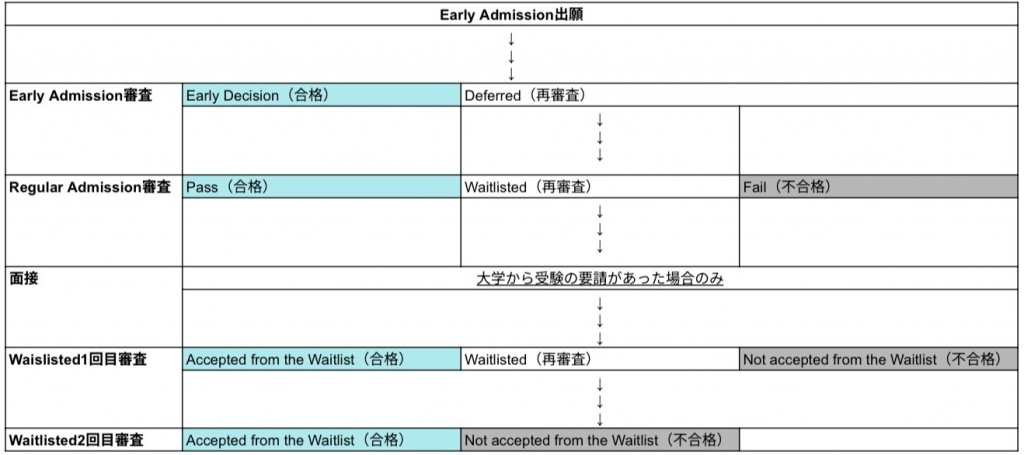
《Regular Admissionのフロー》
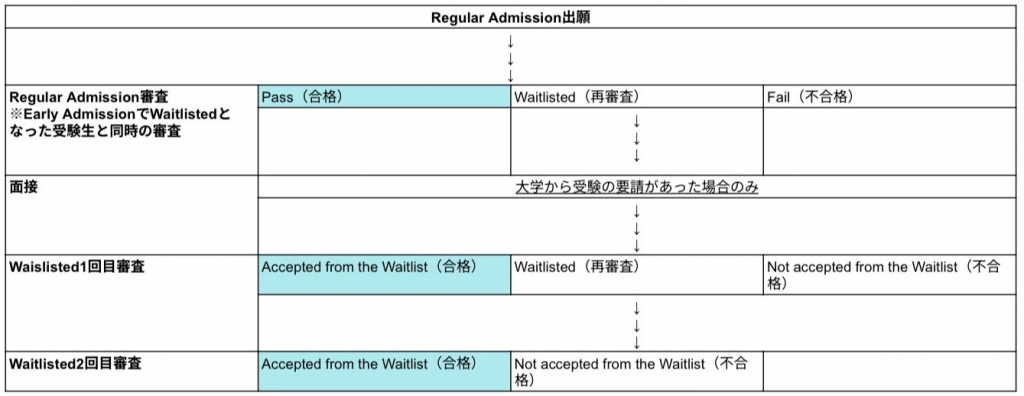
出願に必要な書類について
提出書類のうち、以下のものは特に入念な準備を行う必要があります。
Essay(志望理由書、800語ほど)
2025年度入試から、4月入学(国外)および9月入学の両方で形式が変更されました。
>■4月入学(国外)
5つのQuotations(書籍などから引用された文)から2つを選択し、なぜその2つを選択したのか、これらが自分の志望理由や将来の学びにどう関係しているのか…などを論述します。字数は800語ほどです。
実際のQuotationsおよびEssay Questionsはコチラ、「Application Documents for 2026 AO April Entry (Overseas)→Essay Questions and Instructions」を参照。
■9月入学
Early AdmissionおよびRegular Admissionとでお題が異なります。なお、本稿執筆時点でのお題の公開予定日は以下の通りです。
Early Admission:2025年12月23日午前10時
Regular Admission:2026年1月27日午前10時
Standardized Test(統一試験のスコア)
・SAT
・ACT
・国際バカロレアディプロマ(IB)
・CSAT(大韓民国)
・GCE Advanced Level
・普通高等学校招生全国統一考試(中国)
これらのうち1つ以上のスコアを提出します。どのテストにおいても、大学側から詳細な要件が設けられています。最新の情報は、大学HPおよびSILSの募集要項をご自身でご確認ください。
なお、2026年9月入学の選考から、
・出願締切後に統一試験が実施される
・統一試験のスコア発表が出願締切に間に合わない
・居住国において統一試験が実施されていない
のいずれかに該当する場合、SATまたはACTの提出が必須となります。
英語テストのスコア
以下の英語能力試験のスコアを1種類、提出する必要があります。
・TOEFL iBT
・IELTS Academic Module
ただし、SATやACT、GCE Advanced Levelなどの、カリキュラムの主要言語が英語である統一試験のスコアを提出する場合、英語能力試験のスコア提出は不要となります。
出願対策にあたって注意すべきこと
統一試験や英語資格試験のスコアアップは独りでも可能ですが、書類・面接審査を担当する大学教員を唸らせるEssayを独りで作成するのは難しいですよね。
上述の通り本稿執筆時点でお題は公開されていませんが、一般的にEssayにおいては、以下の要素を読み手にしっかりと伝える必要があります。
・SILSで学びたい!という強い熱意
・SILSで何を学びたいのかおよびその理由
・SILS「に」自分が何を貢献できるのか
・SILSで学んだことを、将来どのように活用するか
Essayの内容が説得力に欠けるものだと判断されてしまうと、合格できる確率は大変低くなってしまいます。そのため、自分の過去をしっかりと振り返り、自分が将来何をどうしたいのか、を熟考した上でEssayを執筆することが大切です。
洋々のサポートについて
洋々では、完全個別指導で、SILSの受験を目指す皆さんを強力にバックアップいたします。
洋々のサポートでは受講生1人に対し、大学生講師(メンター)が1人、社会人講師(プロフェッショナル)1人がアサインされます。
授業時間外においても、他の受講生との交流を図れるイベントや、自らの志望理由書を発表するセッションなど、アクティブラーニング(探求型学習)の機会を提供しています。サポートはZoomでも受講が可能ですので、渋谷への移動が難しい場所に住んでいる方でも、問題なく受講ができます。
個別相談では上記を含めた詳しい内容について担当者が説明いたしますので、以下のボタンをクリックしてぜひご予約下さい!
Waseda SILS AO April Entry (Overseas) and AO September Entry
This page provides an overview of the School of International Liberal Studies (SILS) at Waseda University, its admission process of AO April Entry (Overseas) and AO September Entry, and how you can best prepare for the admission process.
Waseda SILS, explained
Waseda University’s School of International Liberal Studies (hereafter SILS), established in 2004, is a liberal arts faculty that aims to develop individuals with expertise in a wide range of academic fields and disciplines, as well as advanced communication skills in English.
SILS is a pioneer in liberal arts education at Waseda University, allowing students to study across a range of disciplines. The faculty also specifies a one-year study abroad requirement for graduation for those in Study Plan 1 (Note: Students in Study Plan 2 do not have to study abroad), which allows students to study at universities in the U.S.A. and the U.K., as well as in Europe and Asia.
The majority of classes are conducted in English, and SILS is also characterized by its international environment, with many international students studying here.
When and how can I apply? How many points do I need on the standardized test(s)?
SILS conducts separate entrance examinations for April Entry and September Entry.
April Entry consists of two admissions tracks: AO April Entry (Domestic), which is intended for students and graduates of Japanese high schools, and AO April Entry (Overseas), which is intended for students and graduates who have received their education outside Japan. This article focuses on the latter; those seeking information on the April Entry (Domestic) should refer to the relevant page linked here.
For AO September Entry, no such distinction exists. All applicants who meet the eligibility requirements may apply. That said, the majority of applicants for September Entry are students and graduates who have received their education outside Japan.
The number of students admitted is 100 for AO April Entry (Overseas) and 150 for AO September Entry. The rest of the available spaces is filled by the successful applicants of AO April Entry (Domestic) and 一般入試.
The application period for AO April Entry (Overseas) is typically set from late August to early September, with selection results announced in late November of the same year. For applicants whom the university determines require an interview, interviews are conducted around November.
Applications for AO September Entry are divided into two periods: Early Admission and Regular Admission. Applicants must choose one of these periods and may not apply to both. Early Admission typically runs from early to mid-January, while Regular Admission is open from mid-January to early February.
Applicants who apply during the Early Admission period are first evaluated under the Early Decision selection category. Successful applicants are notified of their acceptance in early March.
Applicants who are not admitted at this stage (i.e., those who are Deferred) are re-evaluated together with Regular Admission applicants. The selection results for both Regular Admission applicants and Early Admission applicants who were Deferred are announced in April.
Applicants who are placed on the Waitlist (a standby list) at this stage receive their final results in May or June of the same year. However, since it is entirely possible that the number of admitted students will already have reached the enrollment quota by this point, admission from the Waitlist is considered extremely rare.
Although the selection process may appear somewhat complex, in essence, applicants who apply through Early Admission are given two opportunities for evaluation. For this reason, unless there are special circumstances, Yoyo strongly recommends applying via Early Admission.
Early Admission’s Flow Diagram
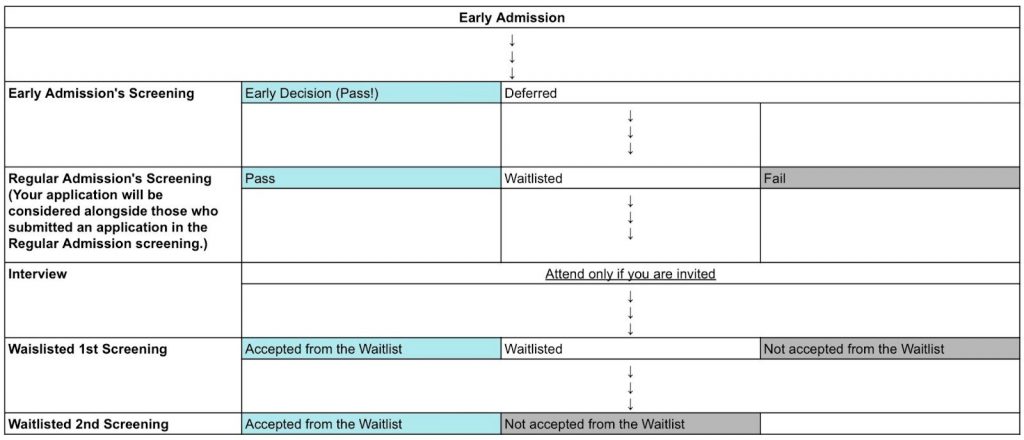
Regular Admission’s Flow Diagram
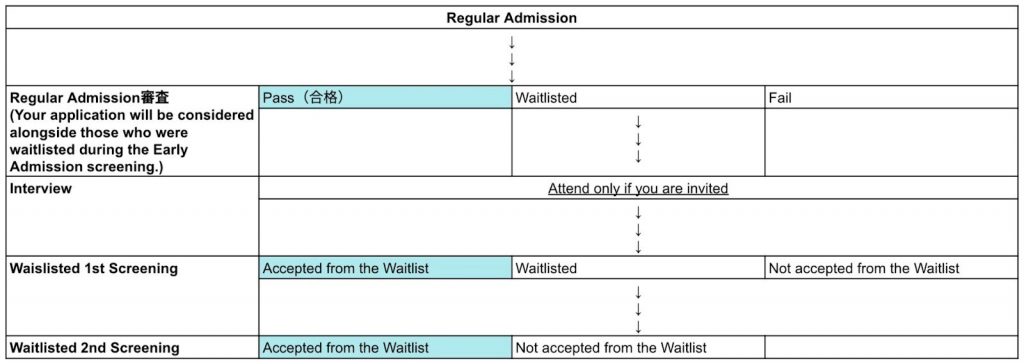
What documents do I need to prepare?
Among the application documents, the following require particularly thorough preparation:
Essay (Statement of Purpose, approximately 800 words)
From the 2025 academic year, the essay formats for April (Overseas) and September admissions have been updated as follows:
■April Entry (Overseas)
Applicants select two quotations from a set of five quotations (taken from books or similar sources) and write an essay explaining why they chose those two quotations, and how they relate to the applicant’s motivation for applying and intended academic pursuits. The essay should be approximately 800 words in length.
For the actual quotations and essay questions, please refer to “Application Documents for 2026 AO April Entry (Overseas) → Essay Questions and Instructions” at the link provided.
■September Enrollment
The essay prompts differ between Early Admission and Regular Admission. As of the time of writing, the scheduled release dates for the prompts are as follows:
Early Admission: December 23, 2025, at 10:00 a.m.
Regular Admission: January 27, 2026, at 10:00 a.m.
Standardized Test Scores
You must submit at least one of the following:
・SAT
・ACT
・International Baccalaureate Diploma (IB)
・CSAT (Republic of Korea)
・GCE Advanced Level
・Gaokao (China)
Each test has specific requirements set by the university. Please check the latest information on the university’s website and the SILS admissions guidelines.
Please also keep in mind that starting from the selection process for admission in September 2026, if you fall into one of these categories below, submission of SAT or ACT scores is mandatory.
・Standardized tests may be conducted after the application deadline.
・Standardized test scores may not be available before the application deadline.
・You are in a country where standardized tests are not conducted.
English Test Scores
You must submit a score from one of the following English proficiency tests:
・TOEFL iBT
・IELTS Academic Module
However, if you submit scores from standardized tests where the main language of instruction is English, such as the SAT, ACT, or GCE Advanced Level, you do not need to submit an English proficiency test score.
Important Considerations for Application Preparation
Improving scores on standardized and English proficiency tests can be achieved alone, but crafting a compelling essay that impresses university faculty during document and interview evaluations is challenging.
In particular, the essay should clearly convey the following to the reader:
・Strong enthusiasm to study at SILS
・What you want to study at SILS and why
・How you will utilize what you learn at SILS in the future
If the content of your statement of purpose lacks persuasiveness, your chances of being accepted will be greatly reduced. Therefore, it is important to carefully reflect on your past experiences and consider what you want to do in the future before writing your statement of purpose.
What Can We (洋々/Youyou) Do for You?
We offer individually customized support sessions that include discussions with instructors. You will be assigned one mentor (university student) and one “professional” instructor to assist you.
We also host events to enhance your understanding of your chosen topic and to facilitate networking with peers who can offer support.
Additionally, you can attend these support sessions and events online through a meeting app like Zoom, eliminating the need to travel to Shibuya.
Every instructor will diligently assist you in preparing your application to Keio PEARL. If you have any questions, please contact us through the form below.
[注意]
当社は、当ウェブサイトに情報を掲載する際には、細心の注意を払っておりますが、これらの情報の正確性および完全性を保証するものではありません。入試に関連する情報は、志望大学・学部のホームページや募集要項などにて、ご自身でも必ずご確認くださいますようお願い致します。また当社は、予告なしにウェブサイト上の情報を変更することがあります。当社ウェブサイトに含まれる情報もしくは内容をご利用になった結果被った直接的または間接的な損失に対し、当社はいかなる責任も負いません。
Although we strive to ensure the authenticity of the information below in a timely manner, please check the faculty’s website, application booklets, and other relevant notifications for the most updated information.The author and publisher disclaim any liability for any consequences, directly or indirectly, related to the use of the information provided in this article.

